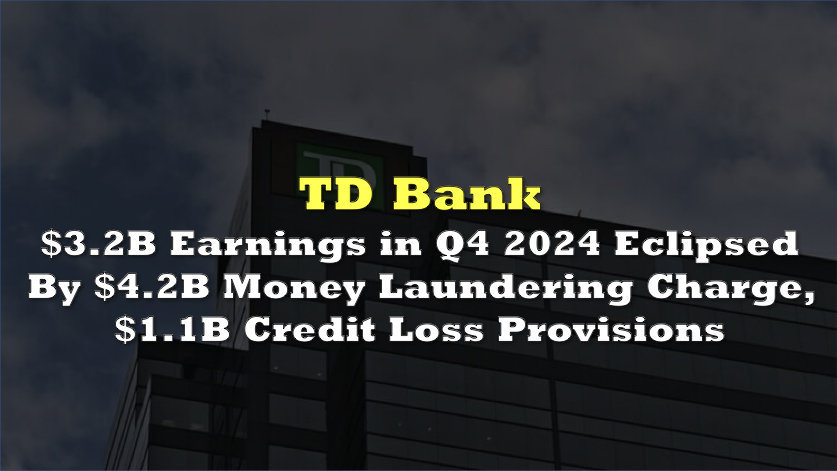A trend seems to be emerging as Canada’s biggest banks continue the earnings season for fiscal Q2 2023.
Canadian Imperial Bank of Commerce (TSX: CM) started the second day of earnings week, reporting $5.70 billion in quarterly revenue. This is a decline from Q2 2022’s $5.93 billion.
While reported net income jumped to $1.69 billion for the quarter from last year’s $432 million, adjusted net income fell down to $1.63 billion from last year’s $1.84 billion. This translates to $1.70 adjusted earnings per share, beating the consensus $1.61 per share estimate.
$CM $CM.TO
— Canadian Banks (@cadbanksonly) May 25, 2023
Q2/F23 EPS of $1.70 ahead of $1.61 consensus, but tax rate looks a bit low and large performing loan release in Canadian Personal. Together, those are about $0.15. Expense growth is coming down. CET1 ratio up to 11.9 but def going to be group low now. All-bank…
“We continued to execute on our client-focused strategy, delivering solid financial results in the second quarter by leveraging the investments we’ve made in high-touch, high-growth markets and furthering our strengths in talent and technology,” said CEO Victor G. Dodig.
The biggest share of income decline came from U.S. Commercial Banking and Wealth Management division, reporting $55 million for the second quarter, down $125 million from a year ago mainly due to provisions for credit losses. On adjusted pre-provision, pre-tax earnings, the figure was $312 million, up $24 million from last year.
The overall provision for credit losses was $438 million, up $135 million from the same quarter last year, owing to an increase in the provision for credit losses on impaired loans that was offset in part by a decrease in the provision for credit losses on performing loans.
Consequently, the bank announced a $0.02 per share increase in dividends, bringing it up to $0.87 per share. This dividend will be paid on July 28, 2023 to shareholders of record as of June 28, 2023.
CIBC last traded at $55.64 on the TSX, falling more than 20% since a year ago.
Royal Bank
Royal Bank of Canada (TSX: RY) saw its quarterly revenue jump to $13.52 billion in Q2 2023, from last year’s $11.22 billion. Net income, however, fell down to $3.65 billion from $4.25 billion in the year-ago period.
On an adjusted basis, the bank saw income decline to $3.76 billion from $4.30 billion in the previous year. This came down to $2.65 adjusted earnings per share, missing the consensus $2.78 per share.
$RY $RY.TO
— Canadian Banks (@cadbanksonly) May 25, 2023
Q2/F23 adj. EPS of $2.65 misses $2.78 consensus. PCLs weren’t totally out of line so miss a function of lower revenue (not the best wealth and CM environment) and higher expenses (+16% y/y). I remember just two quarters ago they were projecting two quarters of 15bps..
“As our second quarter results demonstrate, RBC will never compromise on doing right by our clients and delivering sustainable, long-term value to them, our communities and shareholders. Our focused growth strategy, prudent risk and capital management, and diversified business mix exemplify our strength and stability amidst a complex macro environment,” said CEO Dave McKay.
Personal & Commercial Banking led the net income decline, posting a $319 million drop in net income contribution versus last year, also due to provisions for credit losses.
The total provision for credit losses was $600 million, primarily reflecting provisions taken in the current quarter. Provisions on impaired loans increased $267 million, as the bank said, due to higher provisions in Canadian banking portfolios and capital markets.
RBC also announced an increase to its dividend, upping it by three cents to $1.35 per share, payable on and after August 24, 2023.
Royal Bank of Canada last traded at $123.75 on the TSX.
TD Bank
TD Bank Group (TSX: TD) saw its total revenue increase to $12.37 billion from Q2 2022’s $11.26 billion. Nevertheless, it also posted a lower net income of $3.35 billion from $3.81 billion in the previous year.
On an adjusted basis, net income came in at $3.75 billion compared to the adjusted net income in the year-ago period of $3.71 billion. This translates to $1.94 adjusted earnings per share, missing the $2.06 per share consensus.
$TD $TD.TO
— Canadian Banks (@cadbanksonly) May 25, 2023
$1.94 adjusted EPS misses $2.06 consensus. Similar story here – expenses are hot but revenues are cooling. Minimal performing loan provision build here. It appears also that the fine folks at Cowen forgot to bring revenues with them (Wholesale was bad this q…
“TD’s retail businesses in both Canada and the United States continued to show strong revenue and earnings growth this quarter, with robust customer originations and loan volumes,” said CEO Bharat Masrani. “Investments in differentiated wealth and insurance products and the close of the Cowen acquisition expanded our offerings and strengthened the competitive advantages of these businesses.”
Wealth Management and Insurance division contributed $563 million to the net income, a decrease of 16% from a year ago period. Wholesale Banking also reported a decrease of $209 million in its net income, only posting $150 million for the quarter. This comes as the Wholesale Bank division recently closed its acquisition of Cowen Inc. last March 1 for a reported total consideration of $1.96 billion in cash and shares.
Provisions for credit losses went up to $247 million from last year’s $60 million. As an annualized percentage of credit volume, the provisions came in at 0.19%, an increase of 14 bps compared with the second quarter last year.
TD also announced a $0.96 per share dividend, same with the previous quarter but an increase from last year’s $0.89 per share. The dividends are payable on and after July 31, 2023, to shareholders of record at the close of business on July 10, 2023.
In addition, the bank intends to undertake a normal course issuer bid to repurchase up to 30 million of its common shares for cancellation, representing around 1.6% of the 1.84 billion common shares issued and outstanding as of April 30, 2023.
TD last traded at $81.18 on the TSX.
The earnings release came after the bank announced that it has canceled the plans to acquire First Horizon Corporation (NYSE: FHN). The acquisition, which valued First Horizon at $13.4 billion when announced in February 2022, was put off because the banks did not know whether or not they would have the requisite regulatory approvals, according to TD.
Yesterday’s filings
The Bank of Nova Scotia (TSX: BNS) and Bank of Montreal (TSX: BMO) started this week’s bank earnings season for the second quarter.
The former, operating as Scotiabank, saw its adjusted net income fall to $2.17 billion. Allowance for credit losses increased to $5.93 billion at the end of the quarter from $5.67 billion last year.
Subsequently, the bank also increased its quarterly dividend by three cents to $1.06 per share, payable on July 27.
BMO meanwhile saw its provision for credit losses in Q2 skyrocket to $1.02 billion from $50 million in the same quarter last year. In the three months ending April 30, the bank earned $1.06 billion, or $1.30 per share. This compares to $4.76 billion, or $7.13 per share, in the same period last year.
Like Scotiabank, Bank of Montreal also announced that its board of directors increased the quarterly dividend by 2.8% to $1.47 from $1.43.
Information for this briefing was found via Sedar and the sources mentioned. The author has no securities or affiliations related to this organization. Not a recommendation to buy or sell. Always do additional research and consult a professional before purchasing a security. The author holds no licenses.









